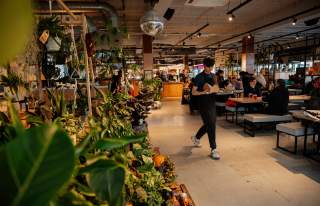How to Make Your Event More Sustainable
There are many ways event organisers can reduce the impact of conferences and events on the planet and our community. We've pulled together some tips to help you take action on climate change and make your event more sustainable.
1. Plan your green policy
-
Planning ahead makes it easier to be more sustainable during your event, and measuring your impacts enables you to identify opportunities for improvements.
-
Determine your sustainability objectives in the early stages of planning your event.
-
Establish a baseline (what your current impact is) and set targets for where you want to get to. Don't try to do everything. Pick achievable and deliverable actions.
-
Produce a clear plan which can be easily shared with all suppliers, partners, delegates, and speakers.
-
Put your plan into action, check your progress and adjust actions if needed.
-
Motivate and raise awareness about the importance of your sustainability approach among your staff and partners. Encourage them to share and spread the concept.
-
Request sustainable services. When communicating with potential service providers, make sure they understand your commitment to sustainability. Ask them to outline their own sustainability approaches and programmes in their proposals.
-
Take any lessons on board for future planning and celebrate success.
Visit Britain in partnership with isla and the GDS Movement have introduced a sustainable events guide with useful tips on developing your green policy and plans. They have also developed a practical tips checklist to help you manage sustainable events.
2. Help participants to find sustainable transport options
-
Encourage your delegates to select their transportation options carefully, giving preference to green public transport options. Provide information on public transport options, cycle hire schemes, car-sharing and park and ride facilities.
-
Encourage participants to walk where possible and supply walking routes to/from the event venues. Manchester is easily explored on foot, with a city centre convention quarter.
-
Delegates can use Manchester’s free ‘hop on, hop off’ service linking the main conference venues, hotels, rail stations, shopping areas and business districts.
-
Manchester’s Metrolink network is the UK’s largest light rail network and is powered entirely by electricity produced by renewable energy.
3. Select venues with strong sustainability credentials
-
When looking for sustainable venues, look for the ones that have a responsible attitude towards the environment and clear sustainability policies. These will guarantee that your event will have a smaller ecological impact by focusing on areas like energy efficiency, waste management and use of materials.
-
Choose hotels and venues close to your main conference venue. This will promote walking and reduce the carbon footprint of your event.
-
Minimise energy consumption by using a venue with natural daylight.
4. Reduce waste
-
Consider going paper-free. A great way to eliminate or drastically reduce the use of paper is to move your conference activity online. Registration, abstract submission and event communication can easily be carried out via an event website, especially if it’s optimised for mobile.
-
Use recycled materials wherever possible.
-
If printing is necessary, use recycled paper or eco-friendly paper. Make sure that printing is double-sided, and that text is optimally formatted to eliminate excess pages.
-
Replace plastic name tags with ones made from recycled cardboard and ribbons. If you do end up using plastic name tags, ask participants to leave them in a box after the event for reuse at future meetings.
-
Reuse and minimise the amount of promotional materials. Banners, posters, etc., can be used several times if designed with re-use in mind.
-
Encourage your delegates to make sustainable choices such as bringing their own reusable water bottles, reducing the number of electrical appliances being used in hotel rooms, keeping towels for more than one night and turning off electricity and air conditioning when leaving their rooms.
5. Make healthy & sustainable food choices
-
Keep it local, organic and fair-trade. Manchester takes ethical eating seriously with many restaurants and catering companies adopting seasonal menus using locally sourced produce and suppliers. Choose a local partner like Open Kitchen Manchester, the city's leading sustainable catering company.
- Avoid disposable cups and cutlery, instead prefer biodegradable and recycled materials.
-
Consider meat-free and plant-based menu choices.
-
Minimise food waste by accurately calculating your attendance numbers and informing the caterers prior to the event. If you still end up with excess food, many venues can donate surplus food to organisations who can redistribute it to the local community.
6. Get back to nature
-
Encourage open-air activities where possible. Greater Manchester offers incredible opportunities to experience the natural environment, with plenty of woodlands, country parks and stunning natural landscapes within easy reach.
-
Provide details of green spaces close to the conference venue for delegates to escape the hustle and bustle of the event and enjoy some quiet reflection.
7. Engage with the local community and leave a legacy
-
Consider how your event might leave a legacy on the host city through programmes which give back to the local community.
-
CSR, volunteering and team building activities can help to offset the impact of business tourism, support sustainability and encourage teamwork. Local community organisations and charities can tailor-make experiences that benefit your corporate and association objectives, their current needs and most importantly, your volunteers.








